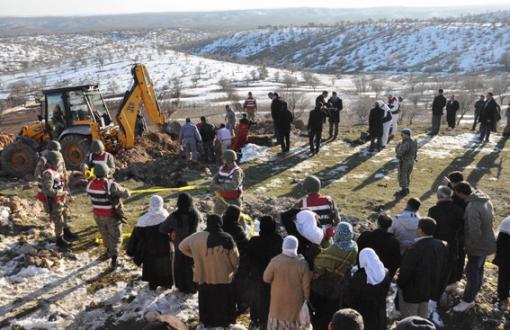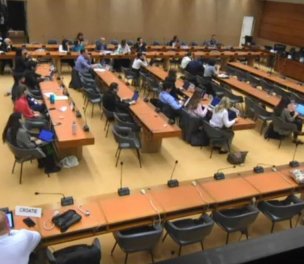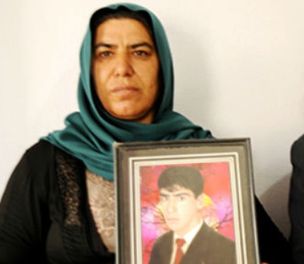Click to read the article in Turkish
All defendants were acquitted yesterday (July 4) in the case concerning the forced disappearances of eight people in the Dargeçit district of Mardin, a predominantly Kurdish-populated province in the country's southeast.
Seven civilians, most of whom are from the same family, including three children, and a specialist sergeant, had gone missing in Dargeçit between October 29, 1995 and March 8, 1996. Bodies of some of them had been recovered later.
Eighteen defendants, including former military officers, were on trial for "premeditated murder."
The court acquitted the defendants because "it was not possible to obtain definitive evidence to link the defendants to the events that took place."
The Gendarmerie Intelligence Counterterrorism (JİTEM), whose existence has never been officially confirmed, is accused of perpetrating thousands of extrajudicial killings in the country's mostly Kurdish-populated regions during the conflict in the 1990s.
While several cases were opened in the early 2010s against former gendarmerie and security officials about the killings purportedly committed by the JİTEM, most of those cases have been completed with courts finding "no such organization." The case publicly known as the "Dargeçit JİTEM case" has become the latest example.
The hearing
Three defendants and attorneys of some defendants attended the hearing at the Adıyaman 1st Heavy Penal Court via videoconference, while other defendants and attorneys did not attend citing excuses.
The court reversed its decision to hear Ahmet Kul, a former prosecutor who could not be found for five years, as a witness, citing the stage the case has progressed to and the arrest warrant against him.
The prosecutor repeated their opinion that the defendants should be acquitted due to the lack of sufficient evidence.
"Seven bodies were burned"
Hizni Doğan, the sibling of Seyhan Doğan, who was 14 when she disappeared, said, "The prosecutor said there is no sufficient evidence. We are tired of repeating since 1996 that there are seven burned bodies. The court will decide today whether we are equal citizens or not. I found my sister's body in a place which the state designated as a security zone."
Abdülaziz Altınkaynak, the father of Davut Altıkaynak, who disappeared at the age of 12, said, "Our children were thrown into wells 27 years ago ... The place where the operation took place and the 120 eter-long well where we found Davut are in the same area.
"Her mother saw Davut undergoing Palestinian hanging at the gendarmerie station. Village guards and soldiers took Davut from home. Why did they throw him into the well and not bring him before the court if he committed a crime?"
"The prosecutor defended the defendants"
Erdal Kuzu, a plaintiff attorney, said the prosecutor, with their opinion as to the accusations, made a defense for the defendants.
He criticized the opinion for dismissing allegations because "there were no camera recordings," noting that the incidents took place in the 1990s.
"The mother of Davut Altınkaynak is evidence, if you want to see it. If you don't you bless the murderers.
"The state has never been sincere in cases of extrajudicial killings ... the insincerity of the state gives power to the defendants. This is not a case to be covered up. People have bodies. It cannot be dismissed by saying that there is no evidence just because there are no camera recordings.
"... Wells are a historical tragedy for the Kurds. Every one of them has a meaning. All those villages were centers of torture. Everybody knows that. Bodies were found in wells. Defendants confessed their crimes."
Gülistan Duran, another plaintiff attorney, said, "There is concrete evidence. There are killed people. There are witnesses. It is not possible for us to agree with the opinion, it is something that acquits the defendants."
Defendants say they were "aggrieved"
Asked for their last words, the defendants demanded their acquittals and said they trust the "Turkish justice."
Their attorneys also demanded the lift of their international travel ban, which they said prevents their clients from attending "engagement and wedding ceremonies" of their relatives and were therefore aggrieved by the ban.
Handing down its judgment, the court acquitted all defendants separately and lifted their international travel bans.
After the verdict, Abdülaziz Altunkaynak, the father of Davut, said, "There is no justice in Turkey. If it was a Turkish child, the court would rule for an execution. It ruled for the acquittal because it was a Kurdish child."
What happened in Dargeçit?On October 28, 1995, two teachers were abducted in Dargeçit. A day later, the son of the Amara village's chief guard was also abducted by the PKK. After the bodies of the three people were found on October 30, detentions started in Dargeçit. On the same day, the house of the Doğan family was raided by a group consisting of 60 to 70 soldiers, special operations members, village guards and plain-clothed people and Seyhan Doğan (14) was detained. On that night and in the following few days, her uncle-in-law Abdurrahman Coşkun (21), her uncle's son Mehmet Emin Aslan (19), her brother Hazmi Doğan (11), Abdurrahman Olcay (20), Nedim Akyön (16), Hikmet Kaya (24), Süleyman Seyhan (57) and his daughter Fehime Çelik were also taken into custody. Raiding a house to detain Davut Altınkaynak (13) on the same night, soldiers detained his mother Hayat Altınkaynak because he was not at home. Threatening his mother to learn the whereabouts of Davut, soldiers managed to convince her that they would just interrogate and then leave him. After detaining Davut, who was staying at his uncle's home, they tortured him in front of his mother with Palestine hanging. Hazni Doğan and Fehime Çelik were also subjected to torture and witnessed what happened to those who were detained. Hazni Doğan, Hayat Altınkaynak and Fehime Çelik were released but nothing was heard from eight people, including two high school students and three children. According to the indictment, Specialist Sergeant Bilal Batırır, who was a Grey Wolf nationalist, was allegedly burned to death by his commanders Hurşit İmren and Mehmet, who feared that he might report them after he opposed what was done to the people. Seyhan Doğan's body was found on March 6, 1996, in a well after a person called her family by phone. Bodies of the other missing people could not be found although it is thought that they were killed. After an application by the families in 2009, an investigation was opened again. The indictment prepared by Midyat Chief Public Prosecutor's Office was accepted by Midyat Heavy Penal Court. Then Gendarmerie Batallion Commander Hurşit Tolon, Dargeçit District Gerdarmerie Commander Mehmet Tire, Dargeçit Central Gendarmerie Station Commander Mahmut Yılmaz and Vice-Commander Haydar Topçam and Specialist Sergeant Kerim Şahin are facing life sentence on the charge of premeditated murder. The case is being heard in Adıyaman city due to "security reasons." |
(AS/VK)






